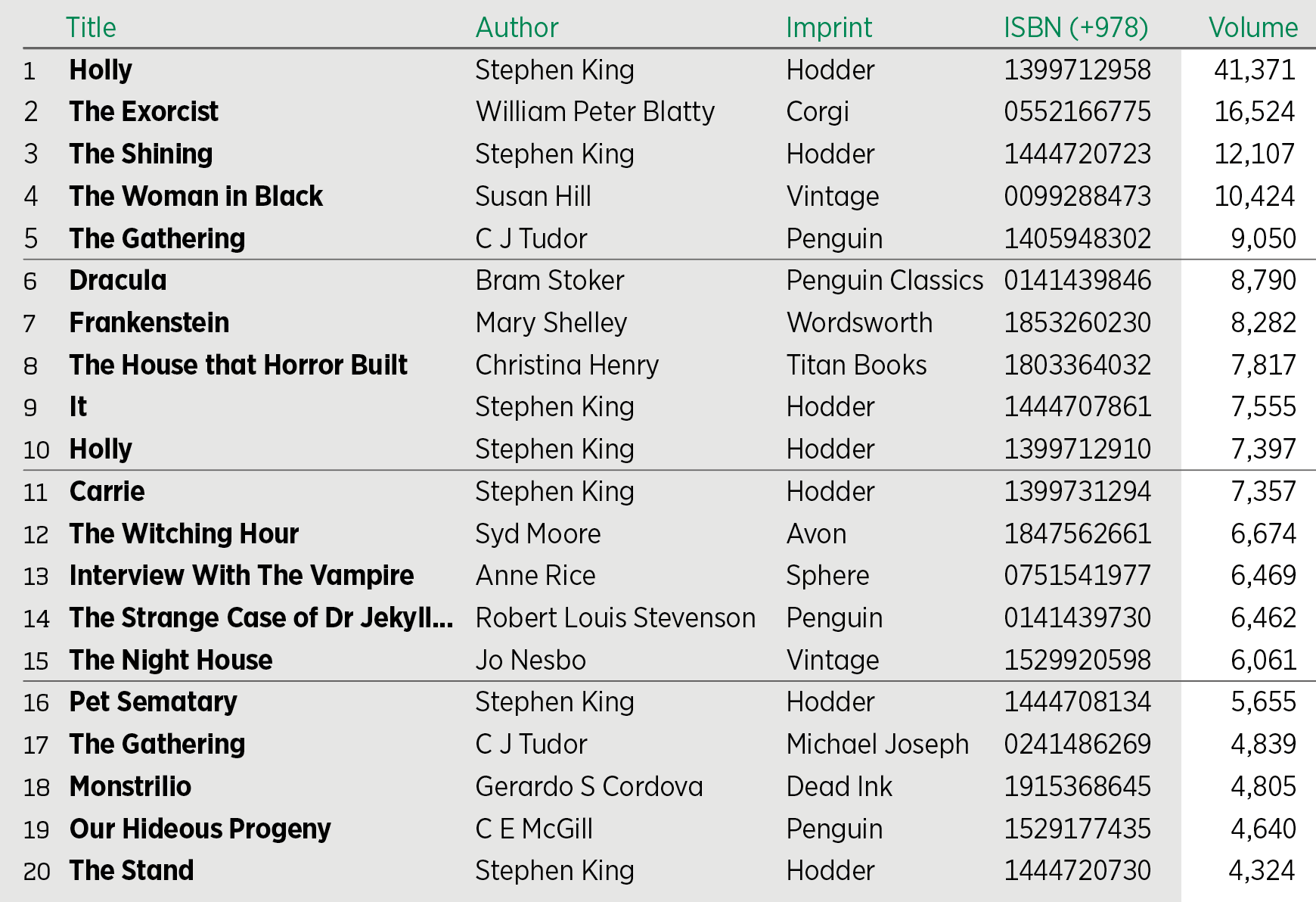Horror and Ghost Stories 2024 — Stephen King retains Horror crown
Growth in the Horror and Ghost Stories category comes as no surprise.

As the cobwebs are cleared away and we face a full week of pumpkin soup, the Horror & Ghost Stories category has grown by nearly £900,000 thus far in 2024, with a 23% rise in volume according to data from Nielsen Bookscan’s Total Consumer Market. And this is coming off a strong 2023 in which the category hit an all-time full-year TCM high of £7.6m.
With seven Stephen King titles inside the category’s top 20, it’s tempting to assume that the American powerhouse is responsible for the bulk of that increase, but in fact, it’s the opposite, with King’s Horror & Ghost Stories sales dropping 11.8% year-on-year.
King fans needn’t worry about this, though: one in five of all books sold in the category can be attributed to the “Master of Horror”—plus, his 2024 release You Like It Darker has been filed under the Short Stories & Fiction Anthologies category. The short story collection has delivered around £200,000 this year, more than 2023’s Holly in the period we’re looking at—and Hodder’s “Ultimate Storyteller” has seen his backlist grow 20.2% over the same period.
Excluding King, the category is up over £1m—30.9% in total—in the 42 weeks to 19th October. The biggest property in the category after King is The British Library’s Tales of the Weird series which sees a revival of a classic novel or short-story collection each month. In 2024 to date, this series has delivered £308,000—up 74.8% against the series’ 2023 performance.
Another classic tale is perhaps the surprise of 2024, as William Peter Blatty’s 1971-published The Exorcist jumped into second place in the category’s bestseller list
If we combined author and series performance in one league table, the British Library would nab the second slot overall from American author Grady Hendrix who drops into fourth place with a sales decline of 26.9%—though only a volume decline of 14.9% as Hendrix annualises his 2023 hardback release of How to Sell a Haunted House with the paperback edition.
Hendrix’s value decline of £49,200 is partly made up for by Bram Stoker who has 29 different editions of Dracula appearing in the category’s Top 5,000. It’s the Penguin Classic, Macmillan Collectors Library and Wordsworth Editions versions that come out on top, though delivering 90% of all sales and an extra £5,000 for the author versus last year. Sales are up across the board though, with an extra £28,000 stake in total
for Stoker.
C J Tudor’s The Gathering—first released in hardback in April, then in paperback in late September—takes two positions in the overall top 20 and rockets the British author into fifth place. Tudor delivers an extra £110,000 this year, but like King before her, this is in part thanks to an administrative difference with 2023’s The Drift coded for the Crime & Thriller category.
Last year’s fifth-placed author, Susan Hill, drops to seventh, but maintains a stable value performance with just an extra £500 going through the tills this year. Hill’s evergreen 1983-published gothic horror, The Woman in Black, reflects this stability by taking fourth position in the top 20, the same slot it occupied last year.
Another classic tale is perhaps the surprise of 2024, as William Peter Blatty’s 1971-published The Exorcist jumped into second place in the category’s bestseller list and delivering an extra £70,000 for the author. The novel has been helped by BookTok and a publicity push centred on the 50th anniversary of the famous film adaptation’s UK release. Similarly, Anne Rice has experienced a £41,000 increase this year thanks to the TV adaptation of Interview with a Vampire which has now aired two seasons in the UK since October 2023.
The final two authors making up the top 10 in 2024 are Christina Henry and T Kingfisher, both of whom are significantly up—Henry brings an extra £60,000 this year, largely thanks to The House that Horror Built, while Kingfisher’s list has grown £11,000.
The top 10 authors/brands are responsible for two fifths of the categories sales, and between them deliver around £280,000 of the benefit the category has seen when compared to last year. This means that an additional £611,000 has been generated by authors outside that list, suggesting that perhaps after all, backlist is the true king.















